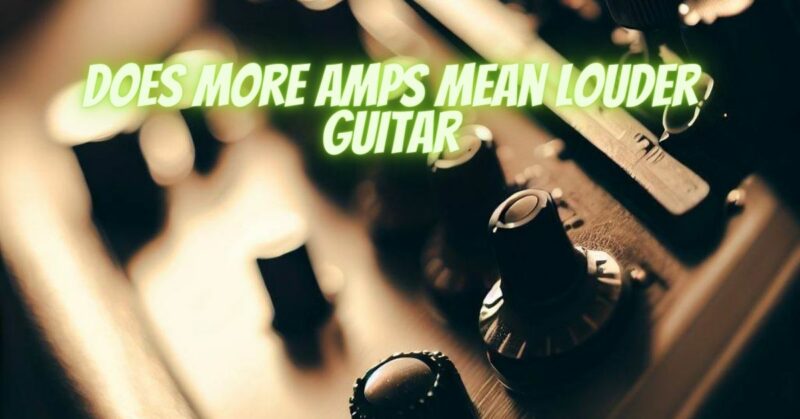In the realm of electric guitars, the amplifier stands as a critical partner in shaping sound, tone, and volume. A common question that often arises is: Does more amps mean a louder guitar? This query delves into the intricate interplay between amplifiers, power, and sonic output. In this article, we’ll explore the significance of amplifier power in influencing guitar volume and the nuanced factors that contribute to achieving the desired auditory experience.
Amplifiers and Guitar Volume
Amplifiers play a dual role in the world of electric guitars: they amplify the electric signal from the guitar’s pickups and shape the resulting sound. Amplifiers consist of various components, including preamps, power amps, and speakers, each contributing to the final output.
- Power Amp Section: The power amp stage is particularly responsible for amplifying the signal to a level that drives the speakers. The power output of an amplifier is measured in watts and directly influences the volume at which the guitar is heard.
- Speaker Efficiency: The efficiency of the speakers in the amplifier’s cabinet also impacts the overall volume. More efficient speakers can convert more of the electrical power into sound waves, contributing to higher volume levels.
- Distortion and Overdrive: It’s worth noting that turning up the volume on an amplifier’s power amp can also lead to natural distortion and overdrive. This effect not only increases volume but also adds a characteristic warmth and saturation to the guitar sound.
The Relationship Between Amps and Guitar Volume
- More Watts, More Volume: Generally, more watts in an amplifier’s power amp section can result in a louder guitar. Doubling the wattage does not necessarily double the volume, but it does lead to a noticeable increase.
- Diminishing Returns: It’s important to understand that the relationship between wattage and perceived volume isn’t linear. As wattage increases, the perceived volume increase becomes less pronounced. For example, doubling the wattage might lead to a 3-5 dB increase in volume, which is noticeable but not overwhelming.
- Headroom and Clean Volume: Higher-wattage amplifiers often provide more headroom, allowing the amplifier to maintain clarity and fidelity at higher volume levels without distortion. This can be crucial for genres that demand clean, undistorted tones even at high volumes.
- Practical Considerations: While it’s tempting to assume that more watts will always equate to a louder guitar, practical considerations also play a role. Different amplifiers have different designs, tonal characteristics, and efficiency levels, which can influence how they project sound.
The question of whether more amps mean a louder guitar is nuanced and interconnected with various factors, including amplifier wattage, speaker efficiency, and personal preferences. While more watts in the power amp section generally lead to increased volume, the relationship is not linear and may vary between different amplifier models.
When seeking to achieve the desired volume and sound quality, it’s essential to consider the context in which you’re playing, the genre of music you’re performing, and the tonal characteristics you’re aiming for. The ideal amplifier strikes a balance between power, tone shaping capabilities, and overall performance, ensuring that your guitar’s voice is heard loud and clear in any musical scenario.


